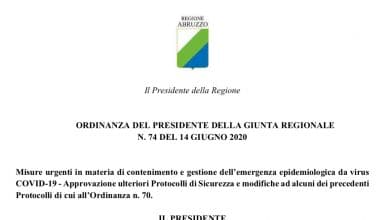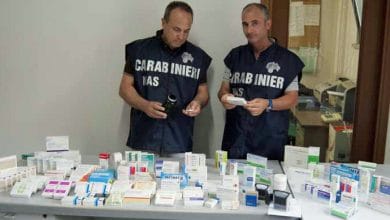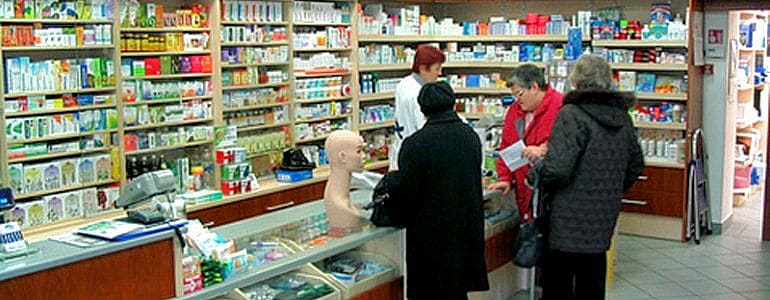
Substitution of the medicine and responsibility of the pharmacist
The public pharmaceutical activity in the Health Trusts of our country is ensured by the pharmacists of the
 SSN. The tasks and functions entrusted to these professionals have, over the years, multiplied and amplified, passing from the simple management of the pharmaceutical warehouse to increasingly complex functions with a proportional increase in responsibilities.
SSN. The tasks and functions entrusted to these professionals have, over the years, multiplied and amplified, passing from the simple management of the pharmaceutical warehouse to increasingly complex functions with a proportional increase in responsibilities.
As is well known, until the enactment of Legislative Decree 87/05, the law did not allow the patient or the pharmacist to replace the product prescribed by the doctor, except in the precise cases established within the NHS for the reimbursement system of the reference, or in particular cases of absolute urgency.
More in particular, substitution is possible (Presidential Decree 371/98, art.6), if the prescribed medicinal product cannot be found in the normal distribution cycle or the pharmacy is exceptionally without it, in fact, in the aforementioned cases, the pharmacist delivers another medicinal product of the same composition and equal therapeutic indication, without constraints regarding the price (art. 6, paragraph 3 of the Convention). The user, informed by the pharmacist of the unavailability of the prescribed medicine and of the possibility of obtaining another corresponding substitute, is free to accept or refuse the pharmacist's offer.
The pharmacist must affix a suitable justification on the back of the prescription, in the space dedicated to him of the replacement. The unjustified or systematic substitution, in addition to the implications on the autonomy and professional responsibility of the doctor and pharmacist, could be connoted as activity punishable under article 171 of RD 1265/34.
It is also necessary to specify that the substitution within the SSN it is justified by the need to ensure pharmaceutical assistance with limited economic resources1, and is rigorously regulated within the reference package and its application is exactly documented by the sticker applied on the mutual prescription.
Outside the reference reimbursement system, the systematic replacement of the medicine prescribed by the doctor had already been characterized in terms of the comparison2.
At stake are the responsibility and professional autonomy of both the doctor and the pharmacist.
Basically, the medical prescription constitutes the authorization to use the medicinal product, and entails the professional responsibility of the doctor in relation to the prescribed medicinal product. The responsibility of the pharmacist, on the other hand, involves the perfect correspondence of the medicine dispensed with that prescribed by the doctor.
The civil code expressly provides for the correspondence between what is ordered by the doctor and what is dispensed by the pharmacist, while the civil liability of the pharmacist does not involve, if the dispensing has been corrected, the responsibilities for the effects of the medicine which in the latter case fall on the doctor himself .
The substitution carried out by the pharmacist could place on the latter responsibilities that do not belong to him, and which he is unable to assume.
Legal configuration of the professional performance of the pharmacist
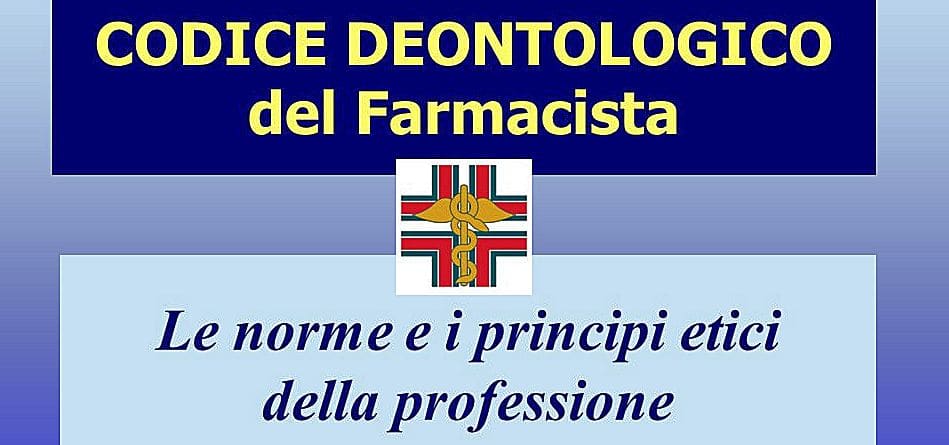 The Code of Conduct collects the principles and rules that all pharmacists enrolled in the register are required to observe, to protect their dignity and professional decorum. By way of example, the art. 1. according to which, the pharmacist must: 1) Exercise his professional activity in a place appropriate to the dignity and decorum of the quality of health care. 2) Perform the role of health educator always keeping in mind the rights of the patient and respect for life. 3) Always be attentive and sensitive to the social and health needs that may arise in the performance of his profession. 4) Always maintain a conduct appropriate to one's role such as not to bring discredit to the profession under any circumstances. 5) Constantly update one's scientific knowledge. 6) Respect the guidelines of a professional nature set out by the National Federation of Pharmacists' Orders and by the Order to which they belong.
The Code of Conduct collects the principles and rules that all pharmacists enrolled in the register are required to observe, to protect their dignity and professional decorum. By way of example, the art. 1. according to which, the pharmacist must: 1) Exercise his professional activity in a place appropriate to the dignity and decorum of the quality of health care. 2) Perform the role of health educator always keeping in mind the rights of the patient and respect for life. 3) Always be attentive and sensitive to the social and health needs that may arise in the performance of his profession. 4) Always maintain a conduct appropriate to one's role such as not to bring discredit to the profession under any circumstances. 5) Constantly update one's scientific knowledge. 6) Respect the guidelines of a professional nature set out by the National Federation of Pharmacists' Orders and by the Order to which they belong.
The pharmacist's service cannot be assimilated to a purely executive service, even though it consists in the delivery of the medicinal specialty specified in the medical prescription, or of a so-called over-the-counter drug; in fact, the pharmacist, within the limits of his knowledge and in relation to individual cases, is also required to provide consultancy as well as verification and control of the requested medical prescription as well as a series of other services of a professional nature3.
The distinctive feature of the intellectual property contract consists in the "discretion" that distinguishes the professional during the execution phase, a character that arises from the very nature of the activity he carries out, which involves a high degree of "freedom of implementation",4 but still within the limits of the client's interest, since in any case "the client's powers of instruction and control cannot affect the substantial autonomy of the intellectual work provider"5.
But it should be emphasized, however, that the indispensable prerequisite is the "personality", so much so that the doctrine considers it legitimate to speak of an "obligation to act as non-fungible"6, or an obligation characterized by a performance which, according to the assessment of the parties, cannot be replaced with another and must be performed personally by the debtor as his personal qualities are relevant to this end.
In fact, as established by art. 2232 of the civil code, the employee must personally carry out the task undertaken (1176 of the civil code7). However, he may avail himself, under his own direction and responsibility, of substitutes and auxiliaries, if the collaboration of others is permitted by the contract or by custom and is not incompatible with the object of the service (1717c.c.8).
More specifically, the profession of pharmacist is regulated by articles 99 et seq., rd July 27 1934, n. 1265 (TU health laws), and, for the management of a pharmacy, the regulation provides for the need for a person in possession of the relative degree diploma and registration in the relative register.
The contracted pharmacist, in the activity of dispensing medicines, takes the form of a professional who, on behalf of the ASL, provides for the provision of a public service and, to this end, is subject to specific obligations which determine his/her inclusion in the organization of health administration9. This is a case covered by art. 2238, paragraph 1, of the civil code, since the professional activity is part of a business activity, and it should be pointed out that in the event that the exercise of the profession constitutes an element of an activity organized in the form of a business, the provisions of Title II also apply.
In fact, the intellectual professional assumes the quality of commercial entrepreneur when he exercises his profession in the context of an activity organized in the form of a company, insofar as he carries out a distinct and absorbing activity which is distinguished from the professional one by the different role played by the substratum organizational which ceases to be merely instrumental and due to the different contribution of the professional, no longer limited to the performance of an intellectual work, but involving a prevalent action of organization, i.e. coordination and control of the production factors, which accompanies the activity technique for the purpose of producing the service.
This operation in the form of a business can be configured in the case of the clinical analysis laboratory, which usually takes the form of an organizational structure of more or less significant dimensions, where the titular professional makes permanent use of a plurality of collaborators and technical equipment in such a way that the The professional activity represents a non-predominant, albeit indispensable, component of the operating process10.
Medical prescription and equivalent medicines
 Law 405/2001 and Law no. 149/2005 converting Legislative Decree 87/2005 art. 1 state that the pharmacist, if the doctor has not indicated the irreplaceability of the prescribed drug, or when the doctor does not put the indication “not replaceable”, after notifying the client, delivers to the latter the drug, with the same active ingredient, pharmaceutical form, route of administration, method of release, number of dosage units and unit doses, having the lowest price, in any case leaving the latter the final choice.
Law 405/2001 and Law no. 149/2005 converting Legislative Decree 87/2005 art. 1 state that the pharmacist, if the doctor has not indicated the irreplaceability of the prescribed drug, or when the doctor does not put the indication “not replaceable”, after notifying the client, delivers to the latter the drug, with the same active ingredient, pharmaceutical form, route of administration, method of release, number of dosage units and unit doses, having the lowest price, in any case leaving the latter the final choice.
The liberalization decree11 recently issued, provides that: "the doctor adds the following words to each drug prescription:"replaceable with a generic equivalent or non-replaceable in cases where there are specific clinical reasons to the contrary”.
The law also specifies that the pharmacist, if the doctor does not indicate the non-substitutability on the prescription, he is required to supply the equivalent generic medicine with the lowest price, unless otherwise requested by the customer.
This duty is also specified by its code of ethics which in art. 12 he claims: the information provided must be clear, correct and complete with reference to the medicines.
So for a correct acquisition of informed consent to replace the original drug with the generic equivalent drug, the pharmacist can tell the patient that the equivalent drug is similar, not that it is the same as the original.
With regard to the substitutability of the products, it is necessary to specify that for the purposes of the issuance of the AIC it is foreseen that the generic medicine has the results of bioequivalence tests, in accordance with what is defined by the European guideline, according to which it is acceptable for the generic to show a variation of some kinetic parameters in the body (indicative of the absorption and distribution of the drug) equal to +/- 20% compared to the product of reference.
Having established the parameters for the determination of equivalence implicitly leads to establish that the concept of equivalence should not be confused with that of equality.
In fact aClaiming that it is the same incorrectly orients the autonomous choice of the assisted since this statement does not correspond to the truth and therefore could appear as misleading advertising, also prohibited by law n.49/2005 on misleading advertising and by Legislative Decree 216/2006 on drug advertisingthe.
The pharmacist, as he is not qualified to prescribe medicines, activity latter exclusive of the doctor, is not authorized to review the pharmacological treatments prescribed by the doctor and must, on the contrary, comply with what is prescribed by the latter, according to the sentence n.8073 of 28.03.2008 of the Cassation Civil section III°. The obligation to comply with what is prescribed by the doctor, according to the Court, finds a legitimate obstacle only in the hypothesis in which the pharmacist identifies in the prescription the prescription of poisonous substances in non-medicinal or dangerous doses, in which case he must demand that the doctor declares for writing that the administration takes place under his exclusive responsibility, as established by art. 40 of the regulation for the pharmaceutical service issued in 193812.
From this it therefore follows that the pharmacist, who has been presented with a precise medical prescription, is not required to ascertain whether the drug and the dosage of the drug prescribed correspond to the actual therapeutic needs of the patient. He must limit himself to dispensing the drug that the doctor has prescribed.
If the doctor does not affix the note "non-replaceable" on the prescription of an original drug with an expired patent, the pharmacist having acquired the patient's informed consent can dispense an equivalent generic drug.
In fact, nothing prevents the doctor from affixing the note "not replaceable13” also on the prescription of an equivalent drug from a manufacturer he deems more reliable, in which case, for the same cost, the pharmacist is required to dispense exactly what the doctor has prescribed.
The art. 26 of the pharmacist's code of ethics states that in the event of a doubtful prescription, the pharmacist is required to contact the prescribing doctor for the necessary clarification, since the shipment of the medical prescription presupposes certainty in the pharmacist and safety for the patient.
The responsibility of the pharmacist. The intervention of the Supreme Court.
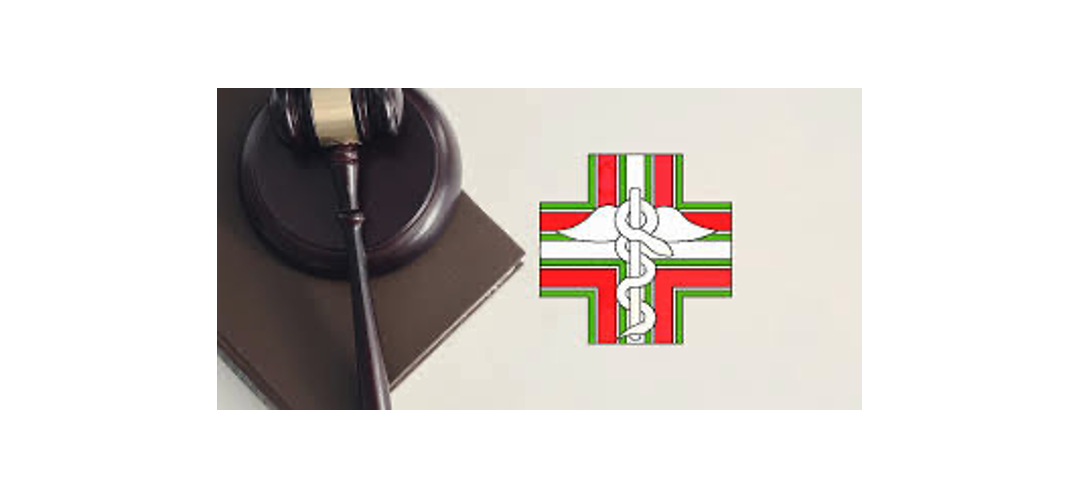 The pharmacist provides a public service of public utility. We recall that the art. 1 co. 2 of the law 30.7.1998, no. 281 in recognizing and guaranteeing the individual and collective rights and interests of consumers provides a series of fundamental rights for the consumer user, largely applicable also to the relationship between pharmacist and customer; the latter integrate the content of the contract intended as a legal relationship between the client and the professional.
The pharmacist provides a public service of public utility. We recall that the art. 1 co. 2 of the law 30.7.1998, no. 281 in recognizing and guaranteeing the individual and collective rights and interests of consumers provides a series of fundamental rights for the consumer user, largely applicable also to the relationship between pharmacist and customer; the latter integrate the content of the contract intended as a legal relationship between the client and the professional.
Any breach by the pharmacist can be deduced from both the duties listed in the deontological code and the rights of the consumer-customer. It seems appropriate to specify that, even in the event that a pharmacist carries out a service that involves the solution of particularly difficult technical problems, the latter will not be liable for any damages that may be caused, except in the case of gross negligence or willful misconduct , pursuant to article 2236 of the civil code. Given that the activity of the pharmacist hardly consists in resolving cases of particular difficulty, he generally liable even for slight negligence.
Still on the subject of liability, the protection pursuant to article 1176, paragraph 2, must also be considered applicable; therefore, in order to verify any non-compliance, it will be necessary to evaluate compliance with the technical rules and duties of the pharmacist's activity, also with reference to the rules of an ethical nature and the principles of professional deontology, also observing the behavioral precepts that are reflected in the modalities of carrying out the health activity.
The possession then, in the pharmacy, of an expired or imperfect medicinal product is relevant from a civil point of view as governed by art. 2043 of the civil code, criminal law pursuant to art. 443 and 452 of the criminal code, administratively and from a disciplinary point of view pursuant to Presidential Decree 221/50. It should be noted that according to the Court of Cassation, a pharmacist who delivers an expired drug is attributable to negligence in carrying out the necessary checks or in supervising the employees they employ, also on the basis of the mere declaration of the patient relating to the place of purchase of the drug same14.
The pharmacist has the obligation to provide information on how to administer a drug replaced with another having the same active ingredient but a different dosage. It cannot invoke the customer's knowing acceptance of a drug.
The Cassation with the sentence 15734/2010 affirmed the responsibility of the pharmacist for having delivered, instead of the drug prescribed in the dosage indicated by the veterinarian, another drug with the same active ingredient, but intended to treat animals of different and larger sizes.
The pharmacist argued in his defense that the customer was able to read the warnings contained in the package and had informed him of the need to dilute the medicine.
But according to the Supreme Court, the exclusion of liability exists only when the pharmacist complies with the medical prescriptions contained in the prescription containing all the information necessary for dispensing the medicine. The sentence is of considerable importance in establishing the exoneration between the responsibility of the doctor and that of the pharmacist and also introduces for this category of professionals the obligation to provide the customer with all useful information in order to correctly evaluate the convenience of the proposed purchase.
The obligation to provide information, now undisputed for the doctor, also becomes so for the pharmacist as it affects the patient's right to self-determination with regard to the choices that pertain to their health. In order for the compensation liability to arise, it is necessary, however, that the damage is configured as an immediate and direct consequence of the negligent behavior of the pharmacist.
Certainly the pharmacist will not be responsible for any contributing causes such as a medical error in identifying the molecule, but it could be in the replacement of the drug with a different method of administration or with potentially allergenic excipients.
The quality of the prescription and the patient's adherence to the therapy are the result of a dynamic process and of a "meeting and clash of perspectives" between doctor, patient and pharmacist, influenced by multiple variables of a cultural, technical-scientific, legal and environmental, but also psychological and relational and therefore cannot be underestimated by the healthcare professional, even if he is a pharmacist. that the prescription derives from the doctor's diagnostic and pharmacological competence, but only the first is actually able to evaluate all the variables that have led to a particular choice15.
The protection of the patient following unjust damage
The customer who considers himself damaged by the pharmacist's activity has the possibility to choose between the contractual action based on the non-fulfilment and the non-contractual action deriving from an illicit behavior of the latter. In fact, if it deems there is a contractual relationship arising, according to the Supreme Court, from the simple "contact" between pharmacist and customer in places intended for the sale of drugs, and if the pharmacist's activity causes damage, he can always invoke the compensatory protection provided for the tort16.
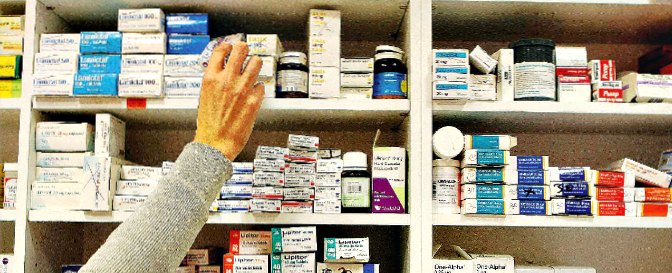 In general, the choice depends on the behavior to be sanctioned; to this end, we remind you that the proof of non-performance must in any case contain that of the damage suffered, generally to health, while the causal link will comply with the provisions of articles 40 and 41 of the criminal code (since it appears clear that in order to prove the breach by the pharmacist, it will in any case be necessary to prove the damage suffered even in the event of a contractual action).
In general, the choice depends on the behavior to be sanctioned; to this end, we remind you that the proof of non-performance must in any case contain that of the damage suffered, generally to health, while the causal link will comply with the provisions of articles 40 and 41 of the criminal code (since it appears clear that in order to prove the breach by the pharmacist, it will in any case be necessary to prove the damage suffered even in the event of a contractual action).
Even if you choose thenon-contractual action, it will be essential to provide proof of the damage suffered and prove the causal link; according to a now consolidated orientation of the Court of Cassation itself, Any so-called moral damage referred to in Article 2059 of the Civil Code can and must also be compensated, regardless of the commission of a crime, since the compensation of a constitutionally protected asset such as the right to health is not subject to any limitation.
The aforementioned actions may be proposed both against the pharmacist and against the pharmacy understood as a structure as a whole. The owner of the pharmacy is liable for all harmful events attributable to the activity carried out within the structure even if attributable to employees or collaborators pursuant to articles 1228 and 2049 of the civil code
If the offenses are attributable to the pharmacist and the employees, both are jointly and severally liable pursuant to article 2055 of the civil code. And moreover, in addition to negligence and imprudence, any liability of the pharmacist also constitutes a cause of liability inexperience understood as a violation of the minimum level of knowledge, experience and professional ability.
By way of example, think of the pharmacist who delivers one drug instead of another or who advises the use of a product unsuitable for the specific case or without first having verified that there are no allergies relating to its use.
Advice may be requested from the pharmacist and the latter can provide medicines for non-serious pathologies for which a medical prescription is not mandatory17. There are doubts about the responsibility, in the case of administration of so-called over-the-counter drugs in the event of no recovery or worsening; it is believed that liability could exist in the event that an unsuitable or contraindicated drug has been dispensed in relation to the pathology found given the experience and knowledge that the aforementioned was required to have in relation to the profession exercised.
1 Tar Lazio RG 3145/02
2 Circular dated 12 November 1998, GU dated 23 November 1998
3 Code of Conduct of the Order of Pharmacists
4 Jacob. G., entry Intellectual professions, in Incyclopedia of law, xxxvi, Giuffrè, 1987, 1073
5 Musolino G., The professional work contract, 1999, Giuffrè, 118
6 Jacob. G., entry Intellectual professions, in Incyclopedia of law, xxxvi, Giuffrè, 1987, 1074
7 The work contract is concluded personal intuition, in the sense that for the client the person of the professional whose professional ability he appreciates is essential
8 The use of collaborators has value only internal, while in relations with customers only the intellectual worker is responsible in all respects
9 In this regard, the Court of Auditors, Section jur. Liguria, 8 August 2007, no. 600, in Report. say. Farm., 2006, 1451
10 Cass. civ., section V, 22 July 2004, n. 13677
11 Article 11 paragraph 9 of Legislative Decree no. 1/2012
12 The responsibility of the Pharmacist, in Dimension Snadim Network
13 Legislative Decree 87/05 (GU 30/05/07), converted into Law 149/05. Equivalence refers to medicines having the same PA composition, pharmaceutical form, route of administration, mode of release and unit dosage, and for price comparison purposes it refers to the dosage unit or unit quantity of the PA. Substitution is also possible with a higher priced medicine, if the prescribed medicine is unavailable or the pharmacy does not have one, with another medicine of the same composition and pharmaceutical form, according to Law 362/99.
14 Study Center of Health Law, Avv. Tiziana Pasquariello
15 Il Sole 24 Ore Healthcare
16 Study Center of Health Law, Avv. Tiziana Pasquariello
17 Study Center of Health Law, Avv. Tiziana Pasquariello
Source Civil right by Francesco Pagano
____________________________
The Parapharmaceutical
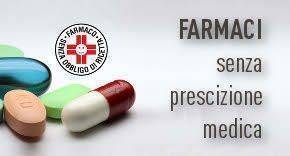 By parapharmaceuticals we mean, in addition to products in the well-being sector (cosmetics, supplements, herbal, health and baby products), over-the-counter industrial drugs not subject to medical prescription (called OTC, over-the-counter, and SOP for brevity). , or Without Prescription Obligation) and most of the homeopathic products.
By parapharmaceuticals we mean, in addition to products in the well-being sector (cosmetics, supplements, herbal, health and baby products), over-the-counter industrial drugs not subject to medical prescription (called OTC, over-the-counter, and SOP for brevity). , or Without Prescription Obligation) and most of the homeopathic products.
Within a pharmacy (understood as a point of sale), convenience is generated by the functioning of price competition, an important factor not so much for pharmaceutical products, sold at a predetermined price, as for parapharmaceutical products sold at a free price following the liberalizations established with the Storace decree of 2005, with the Bersani law of 2006 and finally with the finance law of 2007.
The parapharmaceuticals in fact, they are not regulated, in the sense that they are not included in any list drawn up by the Ministry of Health (cosmetics, supplements, herbal, health and baby products) and the SOPs and OTCs, which do not need a prescription and can in fact also be sold by online pharmacies and parapharmacies.
The large pharmacy: it is sensitive to the increase in the area of the extra drug and not very dependent on the doctor's prescription. It manages large assortments of high-value nutritional supplements and knows how to present its offer to the customer in a competitive way without exaggerating the price.
Often the pharmacy provides the public with a product price to which it adds a mark-up that it deems reasonable to the cost of the product itself, with all the difficulties associated with identifying what the reasonable price is, but above all with the difficulties associated with the list price, the invoice price, the real price due to quality discounts, payment terms, year-end bonuses, off-invoice contributions, the purchase of the same product from the intermediary distributor, etc.
If a pharmacy produces its own branded products, although they are obviously not advertised, they must remain in the first price ranges (high or intermediate), so that the customer perceives them as high quality products.
 The role of the pharmacist in parapharmaceuticals is decisive and takes the form of a more oriented approach to therapeutic advice for the patient.
The role of the pharmacist in parapharmaceuticals is decisive and takes the form of a more oriented approach to therapeutic advice for the patient.
Directing customers towards a higher number of impulse purchases, through merchandising techniques, certainly leads to a good result for strong brands which generally do not have a high margin; on the other hand, the lever of consultancy will reward the smaller brands, with a greater effort on the part of the pharmacist, but with a probably greater profit.
The main role of the manufacturer of the parapharmaceutical is to provide adequate support to the pharmacist to be pro-active and knowledgeable in selling products and in customer loyalty. A considerable change and improvement in the role of the is evident pharmacist, which is recognized in three complementary roles:
- Consultant: because it directs the consumer towards a certain purchasing path;
- Mediator: because it interprets the patient's needs, life habits and therapeutic path;
- Trader: since he is responsible for the presentation and sale of the product.
Each of these roles requires different skills that must be adequately supported by companies in the health sector.
Related news: SIFO. Legal responsibility of the pharmacist
The strategic role of the pharmacy in the distribution of parapharmaceutical products
E-commerce pharmacy, Iqvia data for 2022 available

